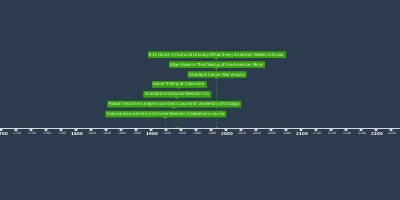Stanford C.I.V. course (1 gen 1988 anni – 20 agos 1990 anni)
Descrizione:
"The two-year debate that began with the Black Student Union's complaints resulted, as so often within contemporary academic culture, in a compromise. After a year and a half of deliberations by a task force appointed by Stanford's provost and then after several months of debate in the Academic Senate, the latter body authorized a new course entitled Cultures, Ideas, Values. The succession of nouns making up the title was selected so that the course could be known by its initials, C.I.V., which evokes the old Western Civilization (traditionally called Western Civ), while omitting only the now-controversial adjective....Yet this new course could also be viewed as a further evolution of the Western Culture course. Most of the older tracks remain in place, though with certain mandatory changes. Since the core list, despite the original intent (or lack of intent) that its selectors claimed, had come to be viewed by some as a sacred canon (at least the course's opponents believed that some took it to be sacred), no single reading list would henceforth be required. Instead, the perceived need for some common experience among students in all tracks will now be met by an annually selected list of several texts, authors, or issues. In order that no trace of sacrality could attach itself to this list, these texts, authors, or issues would be chosen by the teaching staff assigned to the course for a particular year. The first year's list (used in 1988-89) consisted of the Bible, Plato, St. Augustine, Machiavelli, Rousseau, and Marx; one might note that by naming mainly authors that year (the Bible was named by title because of the awkwardness in citing its authorship), tracks could choose those aspects of the author's work that best fit their disciplinary and narrative needs. The staff for the following year (1989-90) named only two authors, Marx and Freud, plus the Bible, and otherwise stipulated simply categories to insure an appropriate coverage of genre and historical period: thus, they called for "a classical Greek philosopher" (nobody disputes that this will mean Plato or Aristotle, perhaps even both); "an early Christian thinker" (St. Augustine, obviously, for most tracks, but St. Benedict, with his time-schedules and his architectural schemes, for Values, Technology, Science, and Society); "a Renaissance dramatist" (whom nobody imagines will be anybody but Shakespeare); "an Enlightenment thinker" (which would allow a track to weight its narrative in a direction suggested either by Voltaire or Rousseau). The refusal to name the last four authors can be taken as part of the whole desacralizing process that the proponents of the new course sought to initiate from the start: by naming only categories (except of course for the Bible, Marx and Freud), the staff signals its disdain for the casting of an author into the role of what, in [another] essay, I called the foundation stone of a particular culture....In addition to designating these common categories, the new C.I.V. is required to operate according to certain guidelines that respond to the main criticisms of the earlier course. Each track must "include the study of works by women, minorities, and persons of color," and it must study "at least one of the non-European cultures that have become components of our diverse American society." One might note that the latter guideline can presumably be met through, say, the inclusion of the Bhagavad-Gita, some classical Chinese poems, or a Latin American novel. Indeed, the attempt to approach foreign cultures that have left their impact upon modern America is not altogether different from the attempt by the War Issues course to stress America's European heritage -- except that now the turn is away from the West to the non-West.,,,,In addition, during each of the course's three terms, at least one text, regardless of its author's personal background, is to be used "explicitly . . . to give substantial attention to the issues of race, gender, and class." Thus, Greek slavery could presumably enter a discussion of Aristotle's Ethics or Politics, and later forms of slavery could be explored by way of Caliban's role in The Tempest (both in Shakespeare and in Aime Cesaire's reworking of the play); gender could be central to analyses of such texts by male writers as the Antigone and Madame Bovary. Even if the texts are familiar, the interpretations are new -- indeed, very much in keeping with the methods of research most actively being pursued in the humanities today. And, as I argued in [another] essay, major changes in the interpretation of canonical texts are themselves a way of effecting canon change by what I called "other means."" (Lindenberger)Aggiunto al nastro di tempo:
Data:
1 gen 1988 anni
20 agos 1990 anni
~ 2 years and 7 months
